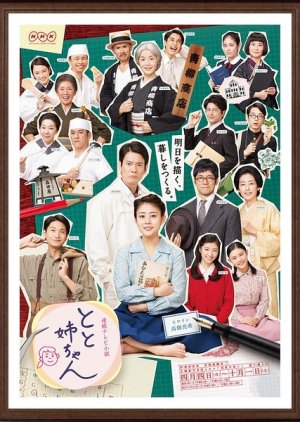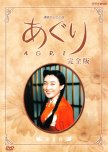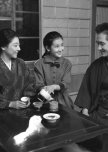 Top 10 Favorite Asadora Heroines by Oricon
Top 10 Favorite Asadora Heroines by Oricon - Română
- English
- magyar / magyar nyelv
- dansk
- Titlu Nativ: とと姉ちゃん
- De asemenea cunoscut ca și: Totone-chan
- Regizor: Ohara Taku, Fujinami Hideki
- Scenarist: Nishida Masafumi
- Genuri: Istoric, Afaceri, Viaţă, Dramă
Cast și credite
- Takahata Mitsuki Rol Principal
- Nishijima HidetoshiKobashi Takezo [Father]Rolul de Sprijin
- Kimura TaeKobashi Kimiko [Mother]Rolul de Sprijin
- Sagara ItsukiKobashi Mariko [Second daughter]Rolul de Sprijin
- Sugisaki HanaKobashi Yoshiko [Third daughter]Rolul de Sprijin
- Mukai OsamuKobashi Tetsuro [Uncle]Rolul de Sprijin
Recenzie

I’ve thought about what makes an asadora like Toto Nee-chan so strong compared to some others, and it’s easy to see what it is: A CLEAR ADHERENCE TO A SINGULAR STORYLINE. From its very first scene (where you see the main characters already grown and succesful as magazine publishers), the stage is set: you are going to hear a tale of a family of three sisters who strive through wars and hardships to one day become publishing giants, and the asadora never wavered. Every arc and challenge the family met became a stone in the foundation of what they would become and what their fortunes and fates would be. From Tsuneko going to school as a child, all the way to success, you follow her through every step of her life, crying and cheering along the way with her.
Usually a show’s best parts are in the first half of the drama and there is some faltering at the second half, but Toto Nee-chan kept you interested with each new development, and I remember being at week 20 and STILL feeling as excited as I was in its first few chapters! And by the time of the show’s last great arc, I couldn’t stop watching, burning through the episodes to see what happened next, I was SO INVESTED and had to force myself to slow down! SUCH a great STORY!
Watching Tsuneko grow up and rise to the challenges to create her dreams in both work and family was a joy to watch and you felt sadness with every tragedy that befell her and warmth in your heart every time she successfully completed her one of her dream goals.
In asadoras, they tended to show the heroine’s entire life, from beginning, middle, and (sometimes) all the way to the end...in that same way, I’m impressed at how well Toto Nee-chan gives you the sense of time moving. People growing up, moving away, etc....
As each arc ends and the children grow older, you really feel like you’re witnessing a whole life’s work. In the latter chapters with the sisters running the publishing house, thinking back on the early episodes where she and her sisters were still living with Grandmother Takiko in Tokyo, it seemed a million years ago, it seemed like a completely different drama! It truly gave you the feeling of history, like those were the "olden days"...
I began watching this because of my love for Mitsuki Takahata, and I’m so glad I did, this asadora has been a tour-de-force for her and has absolutely become my favorite Mitsuki Takahata role and drama! Since picking up Toto Nee-chan, I’ve put her latest show “Muchaburi” on hold so as to not distract from immersing in the asadora, but now it’s done I can finally go back and catch up. Hope it measures up, because Toto Nee-chan has become the Mitsuki Takahata drama ALL others must compare to!
Considerați utilă această recenzie?
A life's worth of tears and laughter
This is my first review. I hadn't planned on writing one, but I couldn't help it, as I realized - somehow astonishingly - no one had done it to this day.I'm not too partial to Asadoras - Ama-chan is the only other one I've seen yet - as I usually think that the dilution of drama and narrative tension over a great number of episodes does a disservice to the overall quality of the work. Yet, amazingly, Toto nee-chan manages to deliver under every aspect.
The story stays compelling from beginning to end, spanning 50 + years of Japan history, as the main characters find and solve new challenges in their daily life, weaving for themselves a path that never feels forced or out of tune. Indeed every choice, every decision, every plot twist (the lone exception in my view being the one in ep. 135) flows naturally from the disposition and nature of Tsuneko and the others , and their responses to the challenges that society and environment pose them.
Heavy subjects like war and its effects on common people, or the condition of working women in contemporary Japan are tackled brilliantly in simple yet not simplistic or moralistic ways.
Amid all this, there's Love and Friendship and Respect and Dignity and Pride; there's also Loss and Pain, but they never come out of nowhere, there's always a meaning and sadness comes through as part of something greater and beautiful.
Japanese artwork in its finer moments has a way of telling you a lot without saying a lot. They understand the spaces between people and the spaces between words, and it never fails to amaze me.
The cast is great. All members of the Kohashi family shine a little bit differently, each part contributing to the whole picture, and the chemistry between Hanayama-san and Tsuneko is the motor of the drama: the two push and complement each other perfectly, resulting in countless exhilarating and moving scenes as they embark in their business journey.
I came upon this drama because of Takahata Mitsuki, that I regard as one of the most promising young actresses in Japan, and I was not disappointed: her impersonation of Tsuneko will be unforgettable - Takahata here has a way of keeping the viewer always on the verge of a deep emotion, without necessarily recurring to tears or exaggerated mimics to do so. The always caring, prideful, brimming with passion Takahata/Toto nee, sometimes reminded me of the acting magic that Mitsushima Hikari so often rewards the viewer with.
Long story short: every drama that leaves you a train wreck of emotions and feelings begging to find their way out, is a drama worth watching. And this is one of those.
Considerați utilă această recenzie?




















































